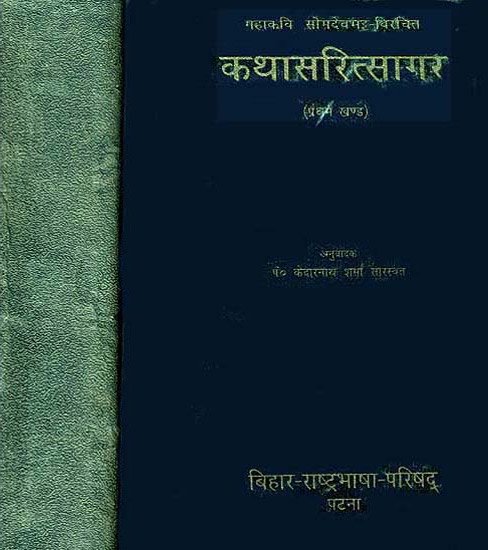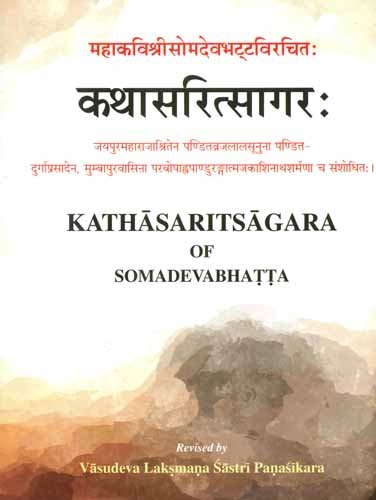Kathasaritsagara [sanskrit]
by C. H. Tawney | 2014 | 226,424 words | ISBN-13: 9789350501351
The Sanskrit edition of the Kathasaritsagara referencing the English translation and grammatical analysis. Written by Somadeva and dating from the 12th century, the Kathasaritsagara (or Katha-sarit-sagara) represents an epic legend narrating the adventures of Naravahanadatta as he strives to become the destined emperor of the Vidyadharas. Alternative titles: (Kathāsaritsāgara, कथासरित्सागर, Kathā-sarit-sāgara)
Verse 8.1.159
श्रीमानुन्नतवंशमौक्तिकमणिश्चन्द्रप्रभो भूपती राजा श्रीसुभटेन सादरमिदं श्रीकोङ्कणाद्बोध्यते ।
नीता मे तनयापहृत्य रजनौ सत्त्वेन केनापि या सा प्राप्ता तव सूनुनेत्यवगतं यत्तेन तुष्टा वयम् ॥ १५९ ॥
śrīmānunnatavaṃśamauktikamaṇiścandraprabho bhūpatī rājā śrīsubhaṭena sādaramidaṃ śrīkoṅkaṇādbodhyate |
nītā me tanayāpahṛtya rajanau sattvena kenāpi yā sā prāptā tava sūnunetyavagataṃ yattena tuṣṭā vayam || 159 ||
The English translation of Kathasaritsagara Verse 8.1.159 is contained in the book The Ocean of Story by C.H. Tawney. This book is available online or you could buy the latest edition:
Read online Buy now! The English translation by C.H. Tawney (2014)
Glossary of Sanskrit terms
Note: This extracts Sanskrit terms and links to English definitions from the glossary, based on an experimental segmentation of verse (8.1.159). Some terms could be superfluous while some might not be mentioned. Click on the word to show English definitions.
Shrimat, Unnata, Vamsha, Uktika, Ani, Candraprabha, Bhupati, Raja, Rajan, Raj, Shri, Subhata, Sadaram, Sadara, Idam, Konkana, Nita, Asmad, Tana, Tanaya, Rajana, Rajani, Sattva, Kena, Kah, Kim, Api, Prapta, Yushmad, Sunu, Iti, Itya, Avagata, Yatta, Tushta, Vaya,
Analysis of Sanskrit grammar
Note: this is an experimental feature and only shows the first possible analysis of the Sanskrit text (Kathasaritsagara Verse 8.1.159). If the system was successful in segmenting the sentence, you will see of which words it is made up of, generally consisting of Nouns, Pronouns, Verbs, Participles and Indeclinables. Click on the link to show all possible derivations of the word.
- Line 1: “śrīmānunnatavaṃśamauktikamaṇiścandraprabho bhūpatī rājā śrīsubhaṭena sādaramidaṃ śrīkoṅkaṇādbodhyate ”
- śrīmān -
-
śrīmat (noun, masculine)[nominative single]
- unnata -
-
unnata (noun, masculine)[compound], [vocative single]unnata (noun, neuter)[compound], [vocative single]
- vaṃśam -
-
vaṃśa (noun, masculine)[adverb], [accusative single]vaṃśā (noun, feminine)[adverb]
- a -
-
a (noun, masculine)[compound], [vocative single]
- uktikam -
-
uktika (noun, masculine)[adverb], [accusative single]uktika (noun, neuter)[adverb], [nominative single], [accusative single]
- aṇiś -
-
aṇi (noun, masculine)[nominative single]
- candraprabho* -
-
candraprabha (noun, masculine)[nominative single]
- bhūpatī -
-
bhūpati (noun, masculine)[nominative dual], [vocative dual], [accusative dual]
- rājā -
-
rājā (noun, feminine)[nominative single]rājan (noun, masculine)[nominative single]rāj (noun, masculine)[instrumental single]rāj (noun, neuter)[instrumental single]
- śrī -
-
śrī (noun, feminine)[compound], [nominative single]śrī (noun, masculine)[compound]
- subhaṭena -
-
subhaṭa (noun, masculine)[instrumental single]
- sādaram -
-
sādaram (indeclinable)[indeclinable]sādara (noun, masculine)[adverb], [accusative single]sādara (noun, neuter)[adverb], [nominative single], [accusative single]sādarā (noun, feminine)[adverb]
- idam -
-
idam (pronoun, neuter)[nominative single], [accusative single]
- śrī -
-
śrī (noun, feminine)[compound], [nominative single]śrī (noun, masculine)[compound]
- koṅkaṇād -
-
koṅkaṇa (noun, masculine)[adverb], [ablative single]koṅkaṇa (noun, neuter)[adverb], [ablative single]
- bodhyate -
-
√budh (verb class 0)[present passive third single]
- Line 2: “nītā me tanayāpahṛtya rajanau sattvena kenāpi yā sā prāptā tava sūnunetyavagataṃ yattena tuṣṭā vayam ”
- nītā* -
-
nīta (noun, masculine)[nominative plural], [vocative plural]nītā (noun, feminine)[nominative plural], [vocative plural], [accusative plural]√nī -> nīta (participle, masculine)[nominative plural from √nī class 1 verb], [vocative plural from √nī class 1 verb]√nī -> nītā (participle, feminine)[nominative plural from √nī class 1 verb], [vocative plural from √nī class 1 verb], [accusative plural from √nī class 1 verb]
- me -
-
ma (noun, masculine)[locative single]ma (noun, neuter)[nominative dual], [vocative dual], [accusative dual], [locative single]mā (noun, feminine)[nominative dual], [vocative single], [vocative dual], [accusative dual]asmad (pronoun, none)[dative single], [genitive single]
- tanayā -
-
tanaya (noun, masculine)[compound], [vocative single]tanaya (noun, neuter)[compound], [vocative single]tanā (noun, feminine)[instrumental single]tanayā (noun, feminine)[nominative single]√tan (verb class 10)[imperative active second single]
- apahṛtya -
-
- rajanau -
-
rajana (noun, masculine)[nominative dual], [vocative dual], [accusative dual]rajani (noun, feminine)[locative single]
- sattvena -
-
sattva (noun, masculine)[instrumental single]sattva (noun, neuter)[instrumental single]
- kenā -
-
kena (indeclinable)[indeclinable]kena (noun, masculine)[compound], [vocative single]kena (noun, neuter)[compound], [vocative single]ka (noun, masculine)[instrumental single]ka (noun, neuter)[instrumental single]kaḥ (pronoun, masculine)[instrumental single]kim (pronoun, neuter)[instrumental single]
- api -
-
api (indeclinable preposition)[indeclinable preposition]ap (noun, neuter)[locative single]
- yā -
-
yā (indeclinable relative)[indeclinable relative]yā (noun, feminine)[nominative single]yā (pronoun, feminine)[nominative single]
- sā -
-
sā (indeclinable correlative)[indeclinable correlative]sā (noun, feminine)[nominative single]
- prāptā -
-
prāptā (noun, feminine)[nominative single]
- tava -
-
yuṣmad (pronoun, none)[genitive single]
- sūnune -
-
sūnu (noun, masculine)[instrumental single]sūnū (noun, neuter)[instrumental single], [dative single]
- itya -
-
iti (indeclinable particle)[indeclinable particle]iti (noun, feminine)[compound], [adverb], [nominative dual], [vocative dual], [accusative dual]itya (noun, masculine)[compound], [vocative single]itya (noun, neuter)[compound], [vocative single]√i -> itya (absolutive)[absolutive from √i]√i -> itya (participle, masculine)[vocative single from √i class 2 verb]√i -> itya (participle, neuter)[vocative single from √i class 2 verb]
- avagatam -
-
avagata (noun, masculine)[adverb], [accusative single]avagata (noun, neuter)[adverb], [nominative single], [accusative single]avagatā (noun, feminine)[adverb]
- yattena -
-
yatta (noun, masculine)[instrumental single]yatta (noun, neuter)[instrumental single]√yat -> yatta (participle, masculine)[instrumental single from √yat class 1 verb]√yat -> yatta (participle, neuter)[instrumental single from √yat class 1 verb]
- tuṣṭā* -
-
tuṣṭa (noun, masculine)[nominative plural], [vocative plural]tuṣṭā (noun, feminine)[nominative plural], [vocative plural], [accusative plural]√tuṣ -> tuṣṭa (participle, masculine)[nominative plural from √tuṣ class 4 verb], [vocative plural from √tuṣ class 4 verb]√tuṣ -> tuṣṭā (participle, feminine)[nominative plural from √tuṣ class 4 verb], [vocative plural from √tuṣ class 4 verb], [accusative plural from √tuṣ class 4 verb]√tus -> tuṣṭa (participle, masculine)[nominative plural from √tus class 1 verb], [vocative plural from √tus class 1 verb]√tus -> tuṣṭā (participle, feminine)[nominative plural from √tus class 1 verb], [vocative plural from √tus class 1 verb], [accusative plural from √tus class 1 verb]√tuś -> tuṣṭa (participle, masculine)[nominative plural from √tuś class 1 verb], [vocative plural from √tuś class 1 verb]√tuś -> tuṣṭā (participle, feminine)[nominative plural from √tuś class 1 verb], [vocative plural from √tuś class 1 verb], [accusative plural from √tuś class 1 verb]
- vayam -
-
vaya (noun, masculine)[adverb], [accusative single]vayā (noun, feminine)[adverb]asmad (pronoun, none)[nominative dual]
Other editions:
Also see the following editions of the Sanskrit text or (alternative) English translations of the Kathasaritsagara Verse 8.1.159
Kathasaritsagar
by Kedarnath Sharma Saraswat (2005)
The Only Edition with the Sanskrit Text and its Hindi Translation (An Old and Rare Book) Set of 3 Vol.
Buy now!
Kathasaritsagara of Somadeva Bhatta (Sanskrit Text Only)
by Vasudeva Laksmana Sastri (2013)
Katha Sarit Sagar in Marathi
by H. A Bhave (1995)
Set of 5 Volumes; Published by Varada Books, Pune. 2256 pages (Throughout B/W Illustrations).
Buy now!
Katha Sarit Sagara (Tamil)
by S. V. Ganapati (எஸ். வி. கணபதி) (2014)
[கதா சரித் சாகரம்] Published by Alliance Publications.
Buy now!
Galpa Shono
by Abhijit Chattopadhyay (2014)
[গল্প শোনো] Galpa Shono: Bengali Translation of 'Suno Kahani From Katha Sarit Sagar'; 9788126015436; Published by Sahitya Akademi, Delhi.
Buy now!Preview of verse 8.1.159 in Bengali sript:
শ্রীমানুন্নতবংশমৌক্তিকমণিশ্চন্দ্রপ্রভো ভূপতী রাজা শ্রীসুভটেন সাদরমিদং শ্রীকোঙ্কণাদ্বোধ্যতে ।
নীতা মে তনযাপহৃত্য রজনৌ সত্ত্বেন কেনাপি যা সা প্রাপ্তা তব সূনুনেত্যবগতং যত্তেন তুষ্টা বযম্ ॥ ১৫৯ ॥
![Kathasaritsagara [sanskrit] - book cover](/uploads/a/Katha-Sarit-Sagara.jpg)




